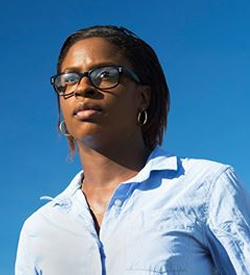

Follow these links to find out more about the Health Policy Project's related work.
- Learn about HPP's work involving Key Populations
- Read about HPP's activities in Jamaica
Organization: J-FLAG
Country: Jamaica
Area of Response to HIV: Key Populations
Interview was originally published in the December 2014 newsletter.
Interview with Latoya Nugent
Latoya Nugent is the education manager at J-FLAG, an organization that promotes the support and acceptance of all people, regardless of sexual orientation or gender identity, through education, policy, and advocacy. She implements cultural sensitivity programs and trainings that promote acceptance and celebration of sexual and gender diversity. She also advocates for better social services for vulnerable populations. The HIV Policy and Advocacy Monitor spoke to Nugent about her advocacy work and J-FLAG's role in ensuring the sustainability of HIV programs.
HIV Policy and Advocacy Monitor: Why did you get involved in policy and advocacy?
I only recently discovered my passion for working with vulnerable populations—including LGBT persons, deported migrants, people living with HIV, and women and children. I spent many years denying that the stigma and discrimination (S&D) I faced when I was younger were a problem. However, as I befriended others belonging to these vulnerable populations, I realized S&D was still very much alive and affecting others besides myself. I realized that my silence was implicitly telling society that discrimination was okay and that I could only help create a welcoming society for vulnerable populations by speaking out.
Prior to becoming involved with human rights advocacy, I was a professor of sociology, politics, and social research at Knox College in Kingston, Jamaica. I took a series of consultancies, including one with the United Nations Population Fund, that engaged me with vulnerable communities and their allies. I realized my passion for working with these groups and eventually encountered J-FLAG, where I saw an opportunity to use both my advocacy and teaching skills.
HIV Policy and Advocacy Monitor: Tell us about your work with J-FLAG.
I have been at J-FLAG since September 2013. The core of my work involves both public education and creating programs to help the general public and members of the LGBT community better understand their roles in creating an accepting environment for gender and sexual minorities in Jamaica. I am also tasked with managing outreach activities. The latter includes the creation of community spaces where members of vulnerable communities are empowered and feel comfortable being themselves, and where the LGBT and ally communities are educated about J-FLAG's work and how they can contribute to the LGBT movement in Jamaica.
HIV Policy and Advocacy Monitor: What policies is J-FLAG working to address?
Two years ago, J-FLAG was instrumental in creating the Police Diversity Policy, requiring police officers to treat all persons in Jamaica equally, regardless of their religion, ethnicity, sexual orientation, class, color, creed, or political ideology. In my opinion, this is one of J-FLAG's most important achievements. Prior to this law, LGBT persons avoided reporting incidents of violence perpetrated against them for fear of further mistreatment by the police. As part of the implementation of the law, police have received several sensitization trainings about human rights. We have started to see a shift in attitudes toward the police, with the LGBT community becoming increasingly comfortable reporting incidents and seeing police as a potential resource.
More recently, J-FLAG's approach to HIV work has shifted from interventions and policies that target men who have sex with men (MSM) toward broader health system measures. We are working with the Ministry of Health to create a healthcare system free of discrimination. We have also trained a number of healthcare workers and partner nongovernmental organizations—such as Jamaica AIDS Support for Life and the Red Cross—who provide services to the LGBT and MSM populations. Our aim is to remove policies and practices that prevent vulnerable populations from accessing HIV prevention, treatment, and care services.
J-FLAG is also working to address LGBT homelessness. We have submitted a policy brief to Parliament with recommendations on how to address this issue, including the creation of a shelter for LGBT homeless persons and more comprehensive social reintegration programs for LGBT persons and their families.
HIV Policy and Advocacy Monitor: What is the role of civil society in ensuring the sustainability of HIV and AIDS programs for key populations in the Caribbean?
Civil society organizations (CSOs) are able to raise awareness and pressure political entities to effect change in ways that individuals and governments cannot. CSOs' involvement in the policy process ensures that an issue is not only addressed, but that is done in a comprehensive manner. In terms of HIV policies, CSOs need to raise their voices and call for change from the government and from the people. Unlike the government, our passion for these issues drives us. By drawing on this passion and working together with other private sector entities we can build coalitions to effectively influence the government and create an enabling environment to support people living with HIV.